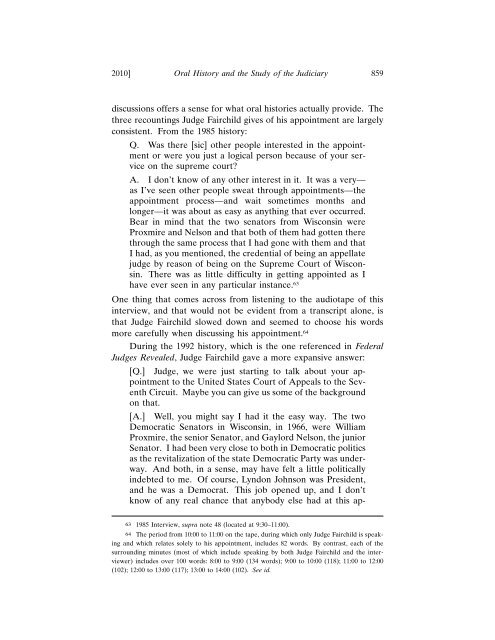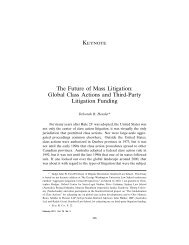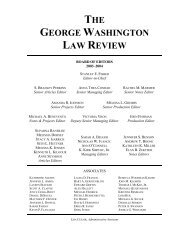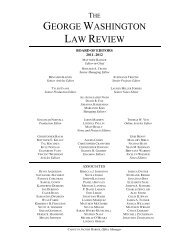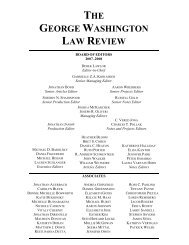View PDF - The George Washington Law Review
View PDF - The George Washington Law Review
View PDF - The George Washington Law Review
Create successful ePaper yourself
Turn your PDF publications into a flip-book with our unique Google optimized e-Paper software.
2010] Oral History and the Study of the Judiciary 859<br />
discussions offers a sense for what oral histories actually provide. <strong>The</strong><br />
three recountings Judge Fairchild gives of his appointment are largely<br />
consistent. From the 1985 history:<br />
Q. Was there [sic] other people interested in the appointment<br />
or were you just a logical person because of your service<br />
on the supreme court?<br />
A. I don’t know of any other interest in it. It was a very—<br />
as I’ve seen other people sweat through appointments—the<br />
appointment process—and wait sometimes months and<br />
longer—it was about as easy as anything that ever occurred.<br />
Bear in mind that the two senators from Wisconsin were<br />
Proxmire and Nelson and that both of them had gotten there<br />
through the same process that I had gone with them and that<br />
I had, as you mentioned, the credential of being an appellate<br />
judge by reason of being on the Supreme Court of Wisconsin.<br />
<strong>The</strong>re was as little difficulty in getting appointed as I<br />
have ever seen in any particular instance. 63<br />
One thing that comes across from listening to the audiotape of this<br />
interview, and that would not be evident from a transcript alone, is<br />
that Judge Fairchild slowed down and seemed to choose his words<br />
more carefully when discussing his appointment. 64<br />
During the 1992 history, which is the one referenced in Federal<br />
Judges Revealed, Judge Fairchild gave a more expansive answer:<br />
[Q.] Judge, we were just starting to talk about your appointment<br />
to the United States Court of Appeals to the Seventh<br />
Circuit. Maybe you can give us some of the background<br />
on that.<br />
[A.] Well, you might say I had it the easy way. <strong>The</strong> two<br />
Democratic Senators in Wisconsin, in 1966, were William<br />
Proxmire, the senior Senator, and Gaylord Nelson, the junior<br />
Senator. I had been very close to both in Democratic politics<br />
as the revitalization of the state Democratic Party was underway.<br />
And both, in a sense, may have felt a little politically<br />
indebted to me. Of course, Lyndon Johnson was President,<br />
and he was a Democrat. This job opened up, and I don’t<br />
know of any real chance that anybody else had at this ap-<br />
63 1985 Interview, supra note 48 (located at 9:30–11:00).<br />
64 <strong>The</strong> period from 10:00 to 11:00 on the tape, during which only Judge Fairchild is speaking<br />
and which relates solely to his appointment, includes 82 words. By contrast, each of the<br />
surrounding minutes (most of which include speaking by both Judge Fairchild and the interviewer)<br />
includes over 100 words: 8:00 to 9:00 (134 words); 9:00 to 10:00 (118); 11:00 to 12:00<br />
(102); 12:00 to 13:00 (117); 13:00 to 14:00 (102). See id.


